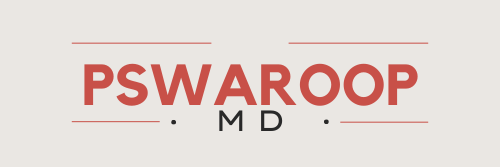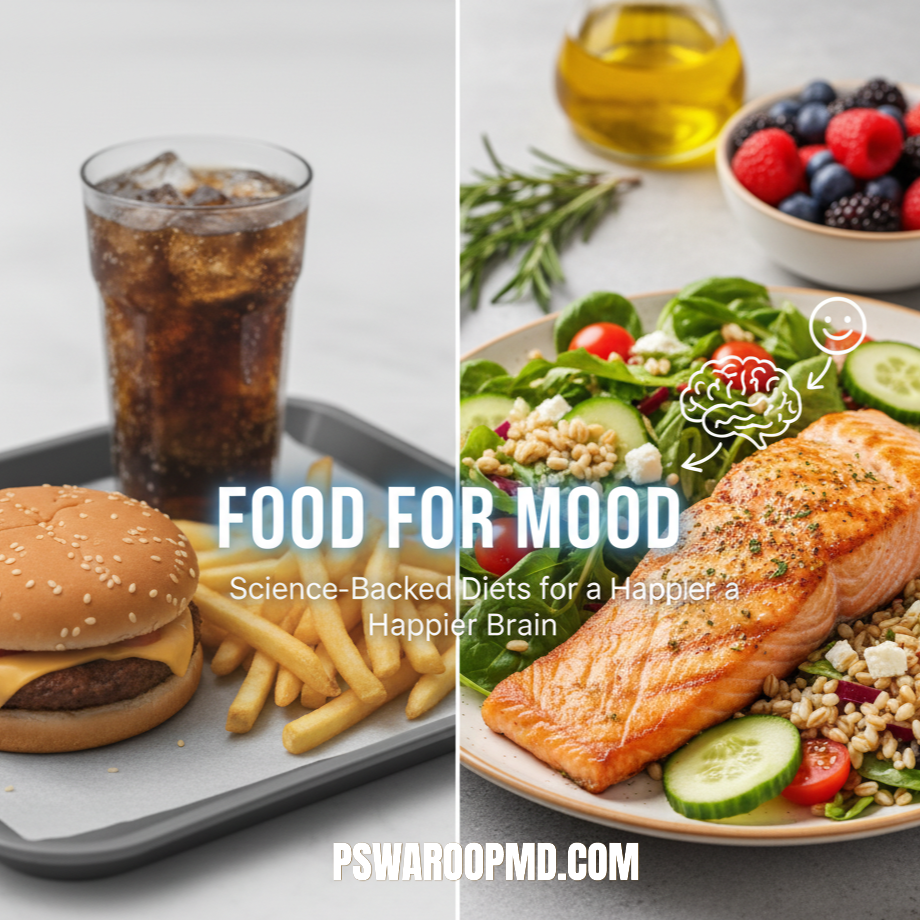It’s time we talked about your brain health. Not just the usual suspects like stress, sleep, and genetics, but something far more tangible, something you interact with multiple times a day: your diet.
As a physician, I’m accustomed to discussing the link between diet and conditions like hypertension, diabetes, and heart disease. In my office, I routinely discuss role of what we eat and what we don’t eat to myriad of GI disorders including GERD, Bloating, Metabolic dysfunction associated liver diseases (MAFLD).
The evidence is overwhelming. But what if I told you that the same disciplined, whole-food approach that protects your cardiovascular system is also one of the most powerful, non-pharmacological tools you have to protect your mood, temper depressive symptoms, and potentially lower your risk of developing depression?
This isn’t just a hopeful theory; it’s the robust conclusion of a large-scale, harmonized meta-analysis that deserves your full attention. The data is compelling, and it forces a fundamental shift in how we view mental wellness—it’s not just above the neck; it starts in the gut and on the plate.
The Unshakeable Evidence: N = 23,026 Reasons to Eat Better
The analysis I’m referring to is a synthesis of six large cohorts, involving over 23,000 adults When you see numbers that large in medical literature, the signal is usually clear, and in this case, it’s a booming confirmation: adherence to healthy dietary patterns is inversely associated with depressive symptoms, both cross-sectionally and prospectively.
What does that mean in practical terms? Simply put, the adults who consistently followed one of three well-established, evidence based diets had fewer depressive symptoms and a lower risk of developing depression over time.
The three all-star diets cited in this study are:
- The Mediterranean Diet: Rich in whole grains, fruits, vegetables, legumes, nuts, and healthy fats (like olive oil), with moderate consumption of fish and poultry, and limited red meat.
- DASH (Dietary Approaches to Stop Hypertension): Focuses on fruits, vegetables, whole grains, lean protein, and low-fat dairy, while limiting saturated fat, red meat, and sugar.
- AHEI-2010 (Alternative Healthy Eating Index): A comprehensive measure of diet quality that emphasizes vegetables, fruit, whole grains, nuts, and long-chain fatty acids, while penalizing processed foods, red meats, and sugar-sweetened beverages.
Notice what these three distinct dietary frameworks have in common: they are built on a foundation of real, minimally processed foods. They are not restrictive fads, but sustainable, nutrient-dense lifestyle changes.
Why the Plate Matters to the Brain
Why are these specific dietary patterns so effective? It comes down to a few core, interconnected biological mechanisms that are central to psychiatric health:
1. The Power of Anti-Inflammation
Chronic low-grade inflammation in the body and brain is a known risk factor for depression. Think of it as a low-burning fire that stresses your neurological systems. The hallmark of the Western diet—high sugar, refined carbohydrates, and saturated/processed fats—is that it feeds this fire.
Conversely, the Mediterranean, DASH, and AHEI principle adherent diets are anti-inflammatory powerhouses. They are rich in:
- Antioxidants: Found in abundance in fruits, vegetables, and olive oil, these compounds neutralize the free radicals that cause cellular stress.
- Omega 3 Fatty Acids: Found in fatty fish (a staple of the Mediterranean and AHEI diets), these fats are crucial building blocks for brain cells and have potent anti-inflammatory effects.
By dousing the inflammatory fire, these diets create a healthier, more stable environment for your neurons to function.
One important caveat and word of caution. So far, it appears that supplements may not give you as much or any benefit over what you can get by consuming natural foods where these compounds exist. So, do not take unnecessary supplements unless you are living in a food desert.
2. The Gut-Brain Axis
Your gut is often called your “second brain” for good reason, and the health of your microbiome (the trillions of bacteria in your digestive tract) is intimately connected to your mood.
The high-fiber content in whole grains, fruits, vegetables, and legumes—central to all three diets—acts as prebiotics, feeding the beneficial gut bacteria. A healthy, diverse microbiome produces vital neurochemicals and regulates the stress response. When you switch from a processed, sugary diet to a whole-food pattern, you are, in essence, rewiring a major pathway that influences anxiety and depression.
3. Nutrient Density and Neurotransmitters
Your brain needs specific micronutrients to synthesize and regulate neurotransmitters like serotonin and dopamine, which are key players in mood regulation. These diets provide:
- B Vitamins (especially Folate): Essential for proper methylation cycles, which are involved in neurotransmitter synthesis. Deficiencies are often linked to depression.
- Magnesium and Zinc: These minerals play a role in numerous brain functions, including stress response and neuroplasticity.
- Tryptophan: An amino acid precursor to serotonin, best obtained from whole food sources.
When you adhere to these healthy eating patterns, you’re not guessing about supplementation; you’re bathing your brain in the precise cofactors and building blocks it needs to function optimally.
A Modifiable Risk Factor
As a doctor, my goal is always to empower you with modifiable risk factors. Genetics, socioeconomic status, and past trauma are complex to address, but what you put into your mouth today, tomorrow, and the day after is entirely within your control.
The major finding from this large meta-analysis is simple but profound: Diet is not just supportive therapy for mental health; it is a powerful, evidence-based preventive measure.
If you are looking for a simple, yet profound, way to support your mental and emotional well-being, the data could not be clearer. It’s time to move beyond the occasional supplement or quick fix and embrace the holistic, sustained health benefits of these established dietary patterns.
Start small but start now. Swap refined grains for whole grains. Add an extra serving of vegetables to dinner. Ditch the sugary soda for water. Every choice that aligns your plate with the principles of the Mediterranean, DASH, or AHEI diets is a protective investment in a healthier, happier brain.
- Association of a Priori Dietary Patterns With Depressive Symptoms: A Harmonised Meta-Analysis of Observational Studies. Nicolaou M, Colpo M, Vermeulen E, et al. Psychological Medicine. 2020;50(11):1872-1883. doi:10.1017/S0033291719001958.
- Healthy Dietary Indices and Risk of Depressive Outcomes: A Systematic Review and Meta-Analysis of Observational Studies. Lassale C, Batty GD, Baghdadli A, et al. Molecular Psychiatry. 2019;24(7):965-986. doi:10.1038/s41380-018-0237-8.
- Moderate- To Long-Term Effect of Dietary Interventions for Depression and Anxiety : A Systematic Review and Meta-Analysis. Abukmail E, Pradeep NK, Ahmed S, Albarqouni L. Annals of Internal Medicine. 2025;. doi:10.7326/ANNALS-24-03016
- Role of Dietary Factors in the Prevention and Treatment for Depression: An Umbrella Review of Meta-Analyses of Prospective Studies. Xu Y, Zeng L, Zou K, et al. Translational Psychiatry. 2021;11(1):478. doi:10.1038/s41398-021-01590-6.

